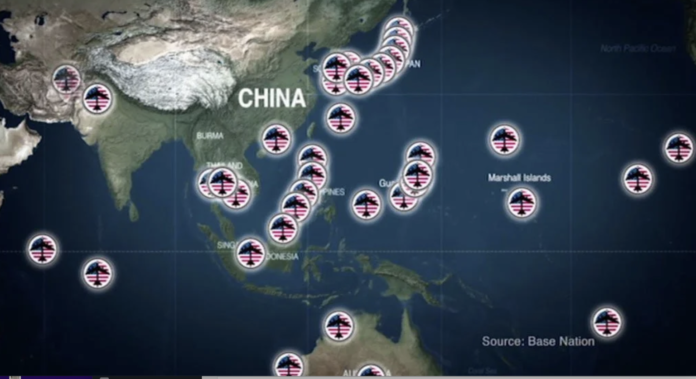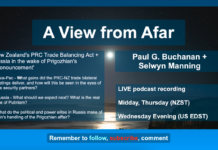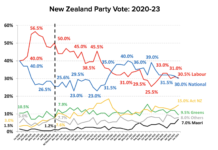A simple explanation of this week’s military and political developments in the Pacific
Fiji repeals Media Industry Development Act
In this column we have discussed Fiji’s controversial Media Industry Development Act 2010. A law that significantly curtailed media freedoms in the nation. This week Prime Minister, Sitiveni Rabuka announced that the law would be repealed.
This announcement was good news for people concerned with press freedom in the Pacific. Initially, Rabuka’s government had released a draft replacement for the Act. The draft was widely condemned during public engagement; with Fijian journalists and media organisations expressing strong opposition.
The opposition appears to have been effective, Rabuka’s government choosing to repeal the whole Act rather than replacing; or ‘reviewing’ it. This change of policy is a ‘win’ for good governance in Fiji because public trust and confidence in government is based on transparency, which is provided by a free media.
Pacific Islands Forum eyes closer trade relationship with China
The Pacific Island Forum is currently discussing developing closer trading links between China and its member states. Essentially, the small nations of the Pacific see opportunities for economic growth by trading with China and are starting work studying options and the negotiations required to establish trade relationships.
This situation is interesting because there are a range of geo-political considerations involved in trade with China. It is a great idea economically and Pacific Island nations are likely to benefit from greater access to Chinese markets. Further, from a security perspective more trade with China may help increase international stability. It is likely that a reason China is not supporting Russia in the Ukraine War is the potential impact on its economy of NATO and United States sanctions.
However, Pacific nations are very small and even as a united trade block will never have the bargaining power of NATO and the United States. And; large Chinese investments in small economies my become a source of leverage in larger military strategy.
So, although trade with China should not be discounted because it may have significant benefits, it is important that Pacific Island Forum nations are aware of the risks. The best mitigation being good governance, especially open and transparent government that ensures negotiations and deals are subject to scrutiny. This allows other nations to express their concerns and discuss them openly increasing trust and confidence both of individual governments and of the Pacific’s wider collective security architecture.
New Zealand and AUKUS
New Zealand has been offered the opportunity to join AUKUS. This is not a surprise; New Zealand is already part of the ‘Five Eyes’ intelligence partnership and has strong historic military connections with the AUKUS partners.
New Zealand’s Defence Minister, Andrew Little confirmed that the nation is open to discussion about the non-nuclear aspects of the relationship. China, expressed its concerns directly to New Zealand’s Minister of Foreign Affairs, Nania Mahuta during a recent visit.
Like many Pacific nations, New Zealand is caught in the middle of any Sino-American tension, China is New Zealand’s main trading partner but the United States and its allies are the country’s main defence relationships. Further, New Zealand is a liberal democratic nation that has expressed its concern about China’s human rights abuses.
It is a difficult situation; New Zealand may soon have to make some difficult decisions. If New Zealand does not participate, it will become increasingly difficult for its military to work with its closest ally Australia; and will further reduce New Zealand’s ability to influence the United States. Likewise, if it does it join AUKUS it risks damaging its relationship with China and possibly trade opportunities.
Russia flexes its muscles in the Sea of Japan
Last week Russia, conducted a missile firing exercise in the Sea of Japan. The exercise involved firing Moskit cruise-missiles from a ship; and comes only weeks after submarine launched Kalibre long-range missiles were test fired in the same area. Further, in September last year China and Russia conducted joint naval exercises near the Kuril Islands, a chain of islands both Russia and Japan claim.
The P-270 Moskit is a cruise-missile designed to skim the surface of the sea, below radar surveillance altitude and hit warships. It has a range of about 120km and is although an old system, first entering service in 1984 it is notable because it uses ramjets for propulsion meaning that it is a fast and difficult missile to counter.
This activity is noteworthy because it demonstrates Russia’s desire to retain its position as a world-power. This exercise is Russia’s attempt to demonstrate that it still has global reach and the ability to project power. The Ukraine War has catastrophically depleted Russia militarily and demonstrated its military weakness. And; Putin is desperate to remain a world power so Russia is flexing its muscles in the Pacific.
It is sad and dangerous. Under Putin’s kleptocracy; and before the Ukraine War Russia’s economy was marginally larger than Australia’s, hardly the economic base of a super power. Now after huge losses in Ukraine, compounded by the stupidity of continuing to fight a losing war Russia’s economic and military power will continue to shrink. A dangerous situation in the Pacific as Putin looks for new ways to demonstrate that Russia is still relevant.
United States tests new hypersonic missile system
Like the United States Marine Corps, the United States Army is preparing for ‘near-peer’ war; or in layperson’s terms fighting Russia or China. The Army’s new organisation for conventional war is the Multi Domain Task Force (MDTF), a new organisation designed to operate on a battlefield full of long-range precision strike weapons. An MDTF is full of surveillance, air-defence and long-range guided weapons.
Last week the United States Army tested its new hypersonic missile system. Hypersonic missiles fly very, very fast and at present are almost impossible to intercept. Russia has used hypersonic missiles in Ukraine and the United States is keen to deploy a similar capability. In 2021, the United States Army Secretary, Christine Wormuth indicated that that 2023 would be the year of ‘long-range precision fires’; meaning that this year a range of new long-range, accurate weapons and the systems and processes to use them effectively were planned to enter service. This test represents a milestone in this capability development programme.
This test is important for the Pacific region because it demonstrates American interest in the area, Two of the five MDTF being generated will be based in the Pacific, one will be in the Arctic (read North Pacific) and this week’s demonstration of hypersonic capability is clearly aimed at China. Brigadier General Bernard Harrington, commander of 1st MDTF, the unit trialling the new weapons stating that “The second half of the Army’s year of long-range precision fires will continue to represent ground-breaking strides toward integrated deterrence in the Pacific.”
‘Integrated deterrence’ is a political way of saying that the United States is ready for conflict and will not be willing to use appeasement as a response to aggression. Previously, we have discussed the United States Marine Corps Littoral Combat Regiments, AUKUS and Japanese ‘counter strike’ all demonstrating a ratcheting up or preparedness for large-scale combat in the region. The MDTF with its new hypersonic capability is consistent with this wider trend in the Pacific Region.
In the Pacific, it is important that we continue to monitor this trend because the Ukraine War appears to have reset the level of acceptable conventional war. During the Cold War, aggression and large-scale conventional warfare was deterred by a nuclear ‘trip wire;’ or the knowledge that the threshold for a nuclear exchange was relatively low. It seems unlikely that a large conventional war in Europe, like the Ukraine War would have been tolerated in the 1960s, 70s or 80s. The Ukraine War could indicate that after nearly 80 years of peace, policy makers are willing to raise the nuclear ‘trip wire’ higher. For instance, if China was to try and invade Taiwan. Would we see the United States using its nuclear deterrent to protect its ally? My assessment is that this is highly unlikely, instead it is more likely that there would be a conventional war fought in the Pacific.
Further, this trend towards more conventional deterrence means that the cost of defence increases. Using the nuclear ‘trip wire’ to secure the ‘rules-based order’ is relatively cheap particularly compared to maintaining large conventional forces able to deter aggression. Therefore, in the Pacific an important policy discussion is coming as nations figure out how to use collective security agreements and alliances to spread the costs of conventional deterrence.
Ben Morgan is a bored Gen Xer and TDBs military blogger





Ben – Nice CIA talking points…try to write it from the Russian point of view…more balanced, and insightful
We are crazy if we don’t take up the opportunity to join AUKUS – NATO and the Russian invasion of Ukraine is clearly showing the value of collective defence relationships and if there is one country we really should be making sure we stay in lockstep with it is Aussie (cue those who are rabidly anti-US and the four-foot ‘Wolf Warriors’) . .
JB, you really don’t have a brain for these things from what I have observed. Supporting a fascist regime apartheid Israel treatment of its indigenous population, nasty rhetoric about Maori now supporting the AUKUS deal that will impact NZ economic lifeline!!
Your a piece of work James+ Brown why don’t you move to a fascist country like the US since you admire & proselytize their existence.
What ‘rules based order’?
The ONLY near thing to that is, do as America says, when it says it, until America chooses it wants to change ‘the rules’ again, when it suits America.
There is NO such thing as ‘rules based order’. NO MATTER how often propaganda outlets repeat the term. The Goebbels (?) quote about repeat a lie often enough and it will be accepted as truth, comes to mind.
Even the UN and those American controlled international organisations with high moral sounding names, are just FRONTS for the American empire. Which by the way is collapsing before our eyes.
Strap-in and watch this historic ‘moment’ unfold.
The Dollar is dying, US Neocon defeat in Ukraine is near & they won’t be able to take on China after that humiliating defeat!
Economic expansion and rivalry is the economic fuel that powers foreign aggression.
Great update. Keep them coming.
Just as you say Ben, transparency and open democracy keeps the imperialists in check.
5 Eyes has proved itself useless in protecting us from white supremacist violence.
The best thing New Zealand could do to not be drawn into the Aukus nuclear pact and to stay as an honest broker between the large competing economic and political and military power blocs, is to break from 5 eyes. 5 Eyes serves US interests more than it serves ours.
5 Eyes negates any possibility of us being able to choose neutrality or non-involvment that we might want in the advent of any inter-imperialist rivalry between the super powers breaking out into armed conflict.
Yay, Pat takes an anti US Imperialist stance.
5 Eyes is an Anglospheric relic that hinders this country from implementing a truly independent foreign policy and mutually agreed bilateral trade and beneficial cultural deals with BRICS and various other nations.
All imperialists are predators
President Biden has used the word “imperialist” to describe Russian Federation foreign policy.
President Putin has used the word “imperialist” to describe the United States foreign policy. Both leaders reject the notion that their own country’s foreign policy is imperialist or predatory in any way.
The partisan supporters of one imperialist power or the other always deny that their chosen side are imperialists.
The undeniable truth is that both the US and Russia have an imperialist foreign policy. Imperialism is an economic system based on infinite growth and expansion.
Infinite growth and expansion on a finite planet has its natural and political limits. Wars occur when imperialist powers try to forcibly expand past those limits.
Imperialism is written into the DNA of capitalism. New Zealand itself has a history of imperialism. Not being big enough to become an imperialist country in our own right, New Zealand for a good part of the 19th 20th centuries acted as a junior partner of the British Empire. The decline of the British Empire following Word War II, New Zealand switched its junior partner relationship to the US.
“Yay, Pat takes an anti US Imperialist stance.” Tiger Mountain
That I have not taken an anti US Imperialist stance, is a lie and a smear spread by the partisan supporters of Russian imperialism. I am sorry that you have fallen for it TM.
The fact is, I have a verifiable history of activism against US imperialism, from the Vietnam war, to the anti nuclear ship movement. To my active opposition to both the Iraq and Afghanistan wars.
Every capitalist country is an imperialist country. (Or at least a nascent imperialist country).
To deny that the Russian Federation is imperialist, is to deny that the Russian Federation is a capitalist country, with a capitalist economy with a need to expand that economy beyond its natural borders.
The imperialist nations need to learn to develop their economies within their own borders, and forgo the predatory expansionary economics of imperialism.
Humanity need to smash the global system of imperialism. Don’t believe the partisan pro-imperialists. Fighting to defend their independence from Russian imperialism the people of Ukraine are weakening the whole global imperialist system.
Three Wars in One; Which kind of war is the war in Ukraine?
https://thedailyblog.co.nz/2023/03/25/guest-blog-pat-odea-three-wars-in-one-which-one-is-ukraine/
This analyses is trash. The Russian are doing military exercise in international waters. The Japanese don’t own the Sea of Japan a 19th century european given name. Just like China doesn’t own the South china seas however the Americans practice military drills of the coast of China.
The analyses is bias but what needs highlighting is AUKUS an arrangement that only the US benefits because it doesn’t live in the Asian economic region. This is our region and is to become one of the most prosperous economic regions because of China.
The quicker the US dies as a superpower the better. The Chinese have offered a better world economic formula that everyone prospers unlike the yanks that only thinks of itself. The US economy is based around war its a military industrial complex and needs war and instability to sell weapons for profit. China promotes peace and prosperity an ancient civilizational society that the west can undoubtedly learn from.
Free NZ
Americas dying influence is seen in the demise of the USD, China’s Diplomacy in the Middle East & Russia demilitarisation of NATO the West & the US!
Free Tibet. Bring back ANZUS.
Castro, Tibet is free what makes you believe that it isn’t?
China and Russia have new designs for the world going forward.
And it mostly involves zero human rights a gun to the head. If you don’t like it, there is always an extended holiday in a “recreational camp.”
You need to substitute Russia & China with AMERICA for your comment to make any sense!
There won’t War over Taiwan! The US is losing its Proxy War in Ukraine & with it any credibility to wage a further War with China!
As batshit crazy as ever Ant Man.
JB, US and your favorite state ‘Apartheid Israel’ are on the chopping block. Your proselytizing of fascism will end in disaster similar to your idol the Fur
It seems that if you swallow one part of the Kremlin propaganda you have to swallow all of it.
AO/NZ is a Pacific nation these days, and the Anglosphere 5 Eyes arrangements are only maintained by a certain section of the ruling class–“deep state agents in wood panelled offices”–as some have put it.
This country is nothing much in the scheme of US Imperialism’s global politics, they already appear to have Deputy Dog Australia lined up. But, if the yanks can keep the AO/NZ political and business elite in the fold, it means they can justify (to themselves at least) an extended physical and surveillance presence in the Pacific region.
Neither Washington, Moscow or Beijing is the working class internationalist position.
Comments are closed.